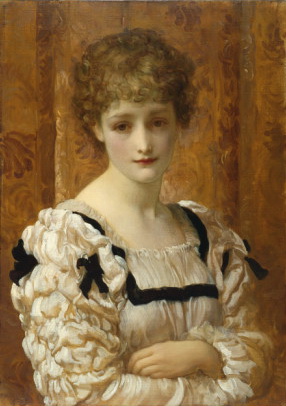
Bianca is a feminine given name. It means "white" and is an Italian cognate of Blanche. It is known in the Anglosphere as a character in William Shakespeare's The Taming of the Shrew. It came to greater notice beginning in the 1970s due to public figures such as Bianca Jagger.
Stephanos or Stefanos, in Greek Στέφανος, is a masculine given name derived from the Greek word στέφανος (stéphanos), meaning "wreath, crown" and by extension "reward, honor, renown, fame", from the verb στέφειν (stéphein), "to encircle, to wreathe". In Ancient Greece, crowning wreaths were given to the winners of contests. Originally, as the verb suggests, the noun had a more general meaning of any "circle"—including a circle of people, a circling wall around a city, and, in its earliest recorded use, the circle of a fight, which is found in the Iliad of Homer. The English equivalent is Stephen.
Melissa is a given name for a female, meaning "honey bee" in the Greek language.
Trish is a feminine given name, often a contraction of Patricia. It may refer to:

Princess Theodora of Greece and Denmark, also known under her stage name Theodora Greece, is a British actress and member of the Greek and Danish royal families. She is the fourth child and younger daughter of deposed King Constantine II of Greece and Queen Anne-Marie of Greece. Theodora made her television debut in 2011 as Alison Montgomery in the American soap opera The Bold and the Beautiful. She has also acted in films, including minor roles in the 2009 romantic comedy The Lightkeepers and in the 2015 war-drama Little Boy.
Angelica is an English language surname and female given name and a variant of Angelika or vice versa.
Chantal is a feminine given name of French origin. The name Chantal can be traced back to the Old Occitan word cantal, meaning "stone". It came into popular use as a given name in honor of the Catholic saint, Jeanne de Chantal. It may also be spelled Chantel, Chantalle, Chantelle, Shantal, Shantel, Shantelle, or Shontelle usually in the USA.
Caitlin is a feminine given name of Irish origin. Historically, the Irish name Caitlín was anglicized as Cathleen or Kathleen. In the 1970s, however, non-Irish speakers began pronouncing the name according to English spelling rules as KAYT-lin, which led to many variations in spelling such as Caitlin, Ceitlin, Catelynn, Caitlyn, Katlyn, Kaitlin, Kaitlyn, Katelyn and Katelynn.
Ariana is a feminine given name, popular in many languages. Arianna and Ariane are the two most common variations.
Jacqueline is a given name, the French feminine form of Jacques, also commonly used in the English-speaking world. Older forms and variant spellings were sometimes given to men.
Vicky, Vick, Vickie or Vicki is a feminine given name, often a hypocorism of Victoria. The feminine name Vicky in Greece comes from the name Vasiliki.
Leah is a feminine given name of Hebrew origin. Its meaning is often deciphered as "delicate" or "weary". The name can be traced back to the Biblical matriarch Leah, one of the two wives of Jacob. This name may derive from Hebrew: לֵאָה, romanized: lē’ah, presumably cognate with Akkadian 𒀖littu, meaning 'wild cow', from Proto-Semitic *layʾ-at- ~ laʾay-at- 'cow'.
Christie or Christy is a given name, used in English for females. The name Christie originated from Italy in 1222, and derives from the Greek names Christos and Christiana. The name Christy appears in Ireland in 1345, and is a common masculine name there. When used as a personal name in English, it is usually a diminutive form of the personal names Christian, Christopher, etc. (masculine), or Christine, Christina, etc. (feminine). The name "Christie" has been assigned other connotations, such as 'angel', 'cute', 'graceful', 'beautiful', 'lovely', even 'princess'.

Tiffany is a primarily English feminine form of the Greek given name Theophania. It was formerly often given to children born on the feast of Theophania, that is, Epiphany. The equivalent Greek male name is Theophanes (Θεοφάνης), commonly shortened to Phanis (Φάνης) and the female is Theophania (Θεοφανία) or Theophano (Θεοφανώ), colloquially Phani (Φανή).

Stephanie is a female name that comes from the Greek name Στέφανος (Stephanos) meaning "crown, wreath, garland". The male form is Stephen. Forms of Stephanie in other languages include the German "Stefanie", the Italian, Czech, Polish, and Russian "Stefania", the Portuguese Estefânia, and the Spanish Estefanía. The form Stéphanie is from the French language, but Stephanie is now widely used both in English- and Spanish-speaking cultures.
Nikita is a common name in Eastern Europe and Greece. The Russian variant originated as a Greek name, and subsequently Russian name. The Ukrainian and Belarusian variants are Mykyta, and Mikita, respectively. The Romanian variant is Nichita. The name is derived from the Greek Nicetas. The Greek name entered Slavic onomastics by way of the veneration of Saint Nicetas the Goth in the Russian Orthodox Church.
Christina or Cristina is a feminine given name. It is a simplified form of the Latin Christiana, and a feminine form of Christianus or a Latinized form of the Middle English Christin 'Christian'. Short forms include Chris and Tina. The name is ultimately derived from the original Greek form of the name, Χριστίνα. The name Christina is most commonly used in the Christian religion.

Princess Maria-Olympia of Greece and Denmark is a fashion model, socialite and member of the former Greek royal family. She is the oldest child and only daughter of Pavlos, Crown Prince of Greece, and his wife, Marie-Chantal Miller. Her paternal grandparents are Constantine II of Greece and Anne-Marie of Denmark, who were the last King and Queen of the Hellenes, while her maternal grandfather is duty free entrepreneur Robert Warren Miller.
Tori is primarily a given name. It is more common among females, and it is often a hypocorism of Victoria. Separately, it is also a name with Hebrew roots, from the name Tova, meaning “good” or “pleasant”, and often associated with the biblical character Ruth. The Japanese meaning of the name is "bird", and may be used for males.




